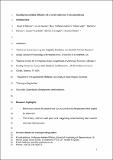Files in this item
Socially transmitted diffusion of a novel behavior from subordinate chimpanzees
Item metadata
| dc.contributor.author | Watson, Stuart K. | |
| dc.contributor.author | Reamer, Lisa A. | |
| dc.contributor.author | Mareno, Mary Catherine | |
| dc.contributor.author | Vale, Gillian | |
| dc.contributor.author | Harrison, Rachel A. | |
| dc.contributor.author | Lambeth, Susan P. | |
| dc.contributor.author | Schapiro, Steven J. | |
| dc.contributor.author | Whiten, Andrew | |
| dc.date.accessioned | 2018-02-08T00:31:28Z | |
| dc.date.available | 2018-02-08T00:31:28Z | |
| dc.date.issued | 2017-06 | |
| dc.identifier | 249098040 | |
| dc.identifier | 7ff7764c-b429-443e-98a2-eac17c5e6129 | |
| dc.identifier | 85011990372 | |
| dc.identifier | 000403923100003 | |
| dc.identifier.citation | Watson , S K , Reamer , L A , Mareno , M C , Vale , G , Harrison , R A , Lambeth , S P , Schapiro , S J & Whiten , A 2017 , ' Socially transmitted diffusion of a novel behavior from subordinate chimpanzees ' , American Journal of Primatology , vol. 79 , no. 6 , e22642 . https://doi.org/10.1002/ajp.22642 | en |
| dc.identifier.issn | 1098-2345 | |
| dc.identifier.other | Bibtex: urn:7faea8c20e47d89e62de7a9131b9e712 | |
| dc.identifier.other | ORCID: /0000-0003-2426-5890/work/65014027 | |
| dc.identifier.uri | https://hdl.handle.net/10023/12690 | |
| dc.description | SKW, GV, RAH, and AW are grateful for the support of the John Templeton Foundation, grant ID40128, “Exploring the evolutionary foundations of cultural complexity, creativity and trust” to AW and Kevin Laland, which funded this project. | en |
| dc.description.abstract | Chimpanzees (Pan troglodytes) demonstrate much cultural diversity in the wild, yet a majority of novel behaviors do not become group-wide traditions. Since many such novel behaviors are introduced by low-ranking individuals, a bias toward copying dominant individuals (“rank-bias”) has been proposed as an explanation for their limited diffusion. Previous experimental work showed that chimpanzees (Pan troglodytes) preferentially copy dominant over low-rank models. We investigated whether low ranking individuals may nevertheless successfully seed a beneficial behavior as a tradition if there are no “competing” models. In each of four captive groups, either a single high-rank (HR, n = 2) or a low-rank (LR, n = 2) chimpanzee model was trained on one method of opening a two-action puzzle-box, before demonstrating the trained method in a group context. This was followed by 8 hr of group-wide, open-access to the puzzle-box. Successful manipulations and observers of each manipulation were recorded. Barnard's exact tests showed that individuals in the LR groups used the seeded method as their first-choice option at significantly above chance levels, whereas those in the HR groups did not. Furthermore, individuals in the LR condition used the seeded method on their first attempt significantly more often than those in the HR condition. A network-based diffusion analysis (NBDA) revealed that the best supported statistical models were those in which social transmission occurred only in groups with subordinate models. Finally, we report an innovation by a subordinate individual that built cumulatively on existing methods of opening the puzzle-box and was subsequently copied by a dominant observer. These findings illustrate that chimpanzees are motivated to copy rewarding novel behaviors that are demonstrated by subordinate individuals and that, in some cases, social transmission may be constrained by high-rank demonstrators. | |
| dc.format.extent | 710052 | |
| dc.language.iso | eng | |
| dc.relation.ispartof | American Journal of Primatology | en |
| dc.subject | Chimpanzee | en |
| dc.subject | Culture | en |
| dc.subject | Dominance | en |
| dc.subject | Rank | en |
| dc.subject | Social learning | en |
| dc.subject | BF Psychology | en |
| dc.subject | NDAS | en |
| dc.subject.lcc | BF | en |
| dc.title | Socially transmitted diffusion of a novel behavior from subordinate chimpanzees | en |
| dc.type | Journal article | en |
| dc.contributor.sponsor | John Templeton Foundation | en |
| dc.contributor.institution | University of St Andrews. School of Psychology and Neuroscience | en |
| dc.contributor.institution | University of St Andrews. Centre for Social Learning & Cognitive Evolution | en |
| dc.contributor.institution | University of St Andrews. Institute of Behavioural and Neural Sciences | en |
| dc.identifier.doi | 10.1002/ajp.22642 | |
| dc.description.status | Peer reviewed | en |
| dc.date.embargoedUntil | 2018-02-07 | |
| dc.identifier.url | http://onlinelibrary.wiley.com/doi/10.1002/ajp.22642/full#footer-support-info | en |
| dc.identifier.grantnumber | 40128 | en |
This item appears in the following Collection(s)
Items in the St Andrews Research Repository are protected by copyright, with all rights reserved, unless otherwise indicated.

